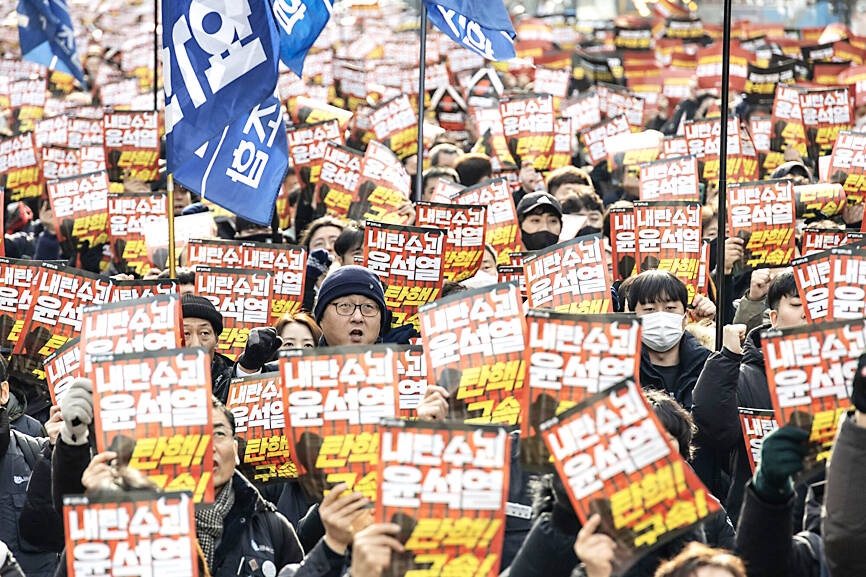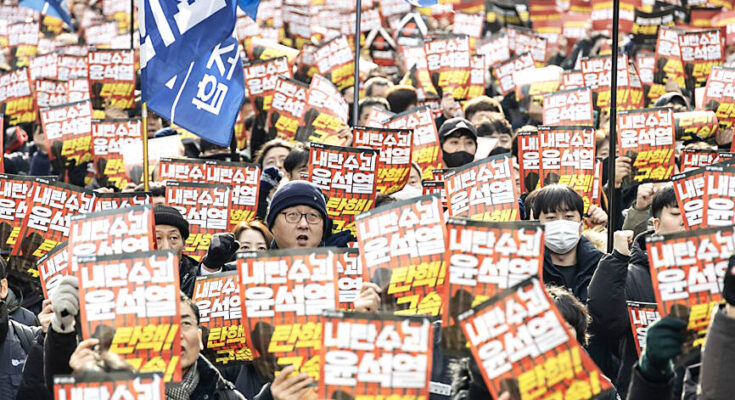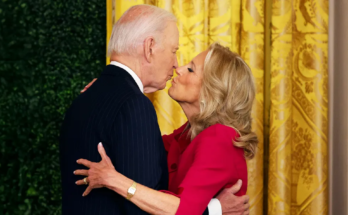‘FIGHT TO THE END’: The South Korean president said he would stop the ‘criminal groups’ that have ‘disrupted the constitutional order’ from threatening the nation
AP, SEOUL
South Korean President Yoon Suk-yeol yesterday defended his martial law decree as an act of governance and denied rebellion charges, vowing to “fight to the end” in the face of attempts to impeach him and intensifying investigations into last week’s move.
Yoon’s statement came hours before the main opposition Democratic Party submitted a new impeachment motion against him for a floor vote this weekend.
Parliament yesterday afternoon passed motions to impeach national police chief Cho Ji-h and South Korean Minister of Justice Park Sung-jae, suspending them from official duties, over their enforcement of martial law.

People hold placards and flags at a rally organized by a metal workers’ union against South Korean President Yoon Suk-yeol in Seoul yesterday.
Photo: Bloomberg
Yoon’s Dec. 3 martial law declaration has generated political chaos and large protests calling for his ouster. The decree brought hundreds of armed troops attempting to encircle parliament and raiding the election commission, although no major violence or injuries occurred.
Martial law lasted only six hours as Yoon was forced to lift it after the South Korean National Assembly unanimously voted it down.
Yoon said he enacted martial law as a warning to the Democratic Party, which controls parliament.
He called the party “a monster” and “anti-state forces” that tried to use its legislative muscle to impeach top officials, undermined the government’s budget bill for next year and sympathized with North Korea.
“I will fight to the end to prevent the forces and criminal groups that have been responsible for paralyzing the country’s government and disrupting the nation’s constitutional order from threatening the future of the Republic of Korea,” Yoon said, referring to the South by its official name.
“The opposition is now doing a sword dance of chaos, claiming that the declaration of martial law constitutes to an act of rebellion, but was it really?” he said.
Yoon said martial law was an act of governance that cannot be the subject of investigations and does not amount to rebellion.
The deployment of nearly 300 soldiers to the National Assembly was designed to maintain order, not dissolve or paralyze it, he said.
The Democratic Party said that Yoon’s statement was “an expression of extreme delusion” and “a declaration of war against the people.”
Kim Min-seok, head of a party task force, accused the president of attempting to incite pro-Yoon riots.
The Democratic Party would focus on getting the motion impeaching Yoon passed tomorrow, Kim said.
It was unclear how Yoon’s comments would affect his fate. The Democratic Party and smaller opposition parties hold 192 seats combined, eight votes short of a two-thirds majority, or 200 of the 300 lawmakers, in the National Assembly.
The earlier attempt to impeach Yoon failed with most lawmakers from Yoon’s governing People Power Party (PPP) boycotting the vote.
Yoon’s speech was expected to deepen a divide inside the PPP.
When PPP Chair Han Dong-hun, a critic of Yoon, called Yoon’s statement “a confession of rebellion” during a party meeting, Yoon loyalists jeered and called on Han to stop speaking.
Han has urged party members to vote in favor of Yoon’s impeachment.
Opposition parties and even some PPP members said that the martial law decree was unconstitutional.
They said that South Korean law allows the president to declare martial law only during wartime or similar emergencies.
Deploying troops to seal the National Assembly to suspend its political activities amounted to rebellion because the constitution does not give a president such rights in any situation, they said.
The country’s law enforcement authorities are investigating whether Yoon and others involved in imposing martial law committed rebellion, abuse of power and other crimes.
A conviction for rebellion carries a maximum penalty of death.
The National Assembly yesterday passed a bill that could introduce an independent counsel to investigate Yoon on rebellion charges without his approval.
A bill it endorsed earlier this week on appointing an independent counsel requires Yoon’s approval.
The South Korean Ministry of Justice on Monday placed an overseas travel ban on Yoon.
South Korean law gives presidents immunity from prosecution while in office, except for allegations of rebellion or treason.
On Wednesday, Yoon’s former defense minister, Kim Yong-hyun, was arrested on allegations of playing a key role in a rebellion and committing abuse of power.
Cho and the head of Seoul’s metropolitan police have been detained while their actions of sending police forces to the National Assembly are investigated as a criminal matter.



